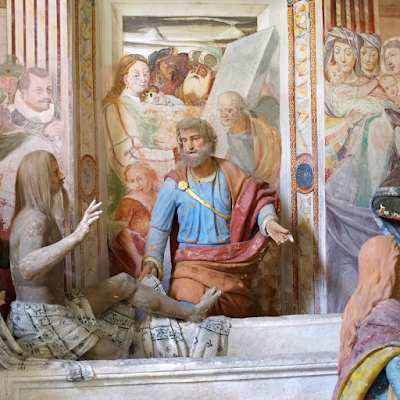Death - the Last Enemy
In the West - and likely in a great many other parts of the world - we are about to celebrate Christmas Day, which happens on December 25. Here, we've secularized the holiday a great deal, so there isn't a lot of religious tradition associated with it for most of us, though some still follow their faiths to chapels or churches. Christmas, which is a Christianized conglomeration of older, more pagan faith holidays, is designated predominantly as a celebration of the birth of Jesus Christ - though historically Christ was born in a different month on the calendar altogether.
I do not adhere to any particular religious tradition - though I recognize the importance of such traditions in our human narrative. However I've enjoyed many lively discussions with friends about the traditional liturgies and doctrines of Christianity, and I could write volumes of discourse about some of the things I've learned.
I wanted to post something near the observed Christian holiday about that religions center-most figure: Christ. More specifically, I wanted to take a look at the recorded teachings of Christ on death and dying, and how they might be interpreted. A warning: if you're a Christian scholar, you'll likely disagree on what I'm proposing here, and you may be entirely right to do so. I'm merely speculating, but feel that it's at least a topic with considering.
First and foremost, Christianity - for the most part - views the Christ figure as someone who conquered death; a man who died and then was resurrected through mystical forces that are yet undescribed, who then ascended into the heavens to reunite with God. I'm oversimplifying this not out of disrespect, but more out of the need for brevity to make a point. The first point is that the Christian view of Christ as a risen mystical figure demonstrates the attempt at fulfilling a need: a need that we may all have (whether Christian or not) to believe that it is possible that someone has gone beyond the veil and made it back. But let's take a further look at the deeper, more hidden dogmas of this tradition.
 |
| Many of the world's religious traditions deal with dying and resurrection. Is this our attempt to demystify and conquer death allegorically? Or does it represent something more? |
Many Orthodox Christians in the West utilize a translation of the Holy Scripture known as the King James Version. It has numerous flaws, not the least of which are the botched translations of some of the original texts, but I won't go into that here. In this King James Version (from here on out I will refer to it as by KJV) we see a translation of a discourse on death in the book 1 Corinthians chapter 15, 26th verse:
"The last enemy that shall be destroyed is Death."
Translation challenges notwithstanding, what could this mean? Well, it could be seen as an attempt by this religious order's adherents to understand and overcome a mystery that is as old as time itself: the mystery of what happens when we experience biochemical death. But could it be more?
There are other verses in the Christian canon that also speak of the future (and history) of death and dying. Take a look:
"...through the appearing of our Savior, Christ Jesus, who has abolished death and illuminated the way to life and immortality to light through the gospel..." Book of 2 Timothy, Chapter 1, verse 10, KJV
"...He will swallow up death forever, and the Lord God will wipe away tears from every face..." Book of Isaiah, Chapter 25, verse 8, KJV
There are many more. Potentially hundreds. It is no secret, of course, that all religious faiths attempt in some way to wrestle with the seemingly heavy concept of death and dying, and oftentimes modern science leaves this debacle for the spiritual traditions of the world. But what if these traditions aren't merely reciting mantras of their devout? What if there is more here than just comfort for those who need it?
What if death and dying really are fictions that will be destroyed once we fully understand the truth around them? Then, we will see them as vanquishable foes, and we likely will no longer stand in fear of their dark mystery. If that's the case, the religious traditions of the world will see their beliefs validated by even the most secular of academics, and what once seemed mystical and unscientific may at least become mainstream and demystified.
I hope that if you're celebrating this season as a holiday - no matter what faith you observe - you will consider that death and dying may really be just that: fictions that have been told to us for so long we no longer know how not to believe in them.
In future posts, I will explore death and dying from other traditions as well.

